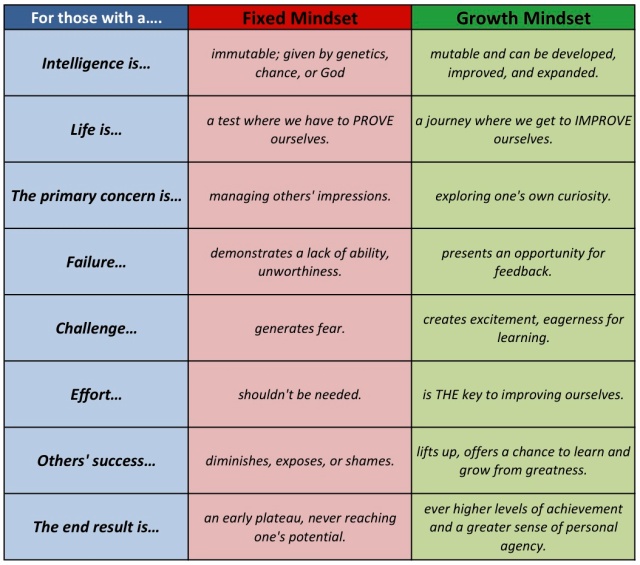Trying to get a glimpse of your own mindset is like inviting a camera to see its own lens. Or like asking a fish to see the water it swims in. It’s tough to gain perspective on something we’re embedded within. That said, the task is not impossible—and taking it on offers a crucial first step on a greatly rewarding path. Once you learn to see your mindset, you can start to choose your mindset. That choice then has a profound impact on your ability to learn and grow, your willingness to get back up after getting knocked down, and your readiness for collaboration with outstanding colleagues.
In brief, a mindset is a mental filter or set of beliefs that determines one’s behaviors, outlooks, and attitudes. It’s a frame of assumptions for what’s possible and what’s real. It’s a colored lens between the world as it really exists and as we perceive it. If I wear a pair of orange-tinted glasses, everything I see will take on that hue. Likewise, everyone who sees me through them will think I have an orange hue myself. The world may in fact be orange, as may I—but it’s hard to know for certain on either side of that filter.
Carol Dweck, author and behavioral psychologist at Stanford University, suggests that among the many mindsets we employ, two of the most powerful to consider are those of the fixed and growth mindsets.[1] A fixed mindset holds that intelligence, talent and ability don’t change—they’re fastened immutably in place. What gifts we have, we’re given at birth. People with this mindset spend a great deal of time trying to demonstrate their abilities, building self-image by shaping what others think of them. Because they spend so much time and energy trying to look good, they carry a constant fear of getting called out

With a fixed mindset, we never flesh out the full potential of our talents.
…..
Courtesy of freedigitalphotos.net
as impostors, as not good enough. Failure demonstrates lack of ability and should thus be avoided at all costs; challenge creates a fear of failure. A fixed mindset similarly undermines effort: if I were really good at this, I wouldn’t have to try. If I have to try, I’m obviously not good at it.
To those with this frame, success becomes a binary game of diminishment: if you do well, I look worse in comparison. As a result, I avoid collaboration and seek to hoard successes for myself. In the fixed mindset, success and safety come when tasks lie closely within grasp, when directions and outcomes remain known or at least predictable. As a result, folks with this frame plateau early and never reach their full potential. Again, we end up with what we came in with. Limited ability becomes a self-fulfilling prophecy.
In contrast, a growth mindset suggests that our intelligence, talent, and abilities remain mutable through application and adjustment. We can work our way into new capabilities. We can develop our talents. Where folks with a fixed mindset see life as a test where we have to prove ourselves, those with a growth mindset channel see life as a journey where we get to improve themselves. Here, what’s traditionally defined as ‘failure’ instead becomes an opportunity for feedback, an invitation for a next iteration. Rather than provoking panic, challenge creates excitement and eagerness for learning. In this realm, effort doesn’t disprove ability, it generates it.
With a growth mindset, others’ success does not eclipse my light but instead amplifies it. Their rising tide lifts my boat as well. Folks in this frame thrive when given the opportunity to test limits and to find new abilities. In the end, driven by a greater sense of agency or free will, they iterate onward, reaching ever higher levels of achievement.
Dweck acknowledges that a growth mindset does not deny the existence of talent. Some of us are given unique abilities and intelligences, whether athletic or mathematical, emotional or kinesthetic, musical or creative. Whether those talents atrophy or bloom, however, depends far, far more on the effort and attention they receive after that initial allocation. Do we water the seeds we’re given? Do we fertilize our original soil? Movement along the path matters far more than the location of the starting point.
After I presented on this topic to an Improvisational Leadership course at the Haas School of Business at UC Berkeley, a student came up to ask me “Do you think one of these mindsets is better than the other?” I couldn’t discern the motivation behind the inquiry and I did not want to suggest he should feel in any way inadequate for espousing a fixed mindset, so I wanted to be careful. After a moment’s pause, I replied “I don’t know for certain if either of them is completely true. They both could be right, in a sense. What I do know is that I greatly prefer a growth mindset. I feel happier, more resilient, and far more engaged with my own unfolding journey. That’s the story I prefer. That’s the story I choose.”
“Maybe even more importantly,” I continued, “I prefer hanging out with other people who share that growth mindset. Folks with a fixed mindset tend toward emotional brittleness and fear. They get uncomfortable with greatness or uncertainty because they’re afraid they’ll look bad in comparison. They judge or dismiss those who threaten their standing. I’d much rather hang with people jazzed by emergent learning, even if that means working through multiple iterations of ‘failure.’ Their generosity and curiosity feed my own. Together, we generate virtuous cycles of growth.”
With a smile both sheepish and hopeful, he then asked “Do you really think it’s possible to change from fixed to growth?”
“Absolutely,” I said, knowing that he was already on the way: the first step in developing a growth mindset is recognizing that there even is such a thing. Again, most of us remain unconscious of the filters we carry. Hopefully, messages like this post or that visit to the Haas classroom help bring the notion to the surface of awareness. The growth mindset is a sticky idea. When it enters your mind and heart, it stays there with a compassionate sense of purpose, pulsating with quiet reminders: you could see this challenge differently. We could try another approach.
Once we understand the idea of fixed and growth mindsets, we can start to examine our own. Watch your thoughts and feelings as you prepare for a challenge, for example. What do you say to yourself beforehand? What do you feel in your body? Where in your body do you feel it? For further fruitful contemplation, observe how you respond to another’s success. Can you celebrate with them or do you want to minimize the achievement? Does their win help you win? Gaining this meta-perspective on our own thoughts begins the process of unraveling any crippling filters we possess. Right off the bat, it builds a growth mindset.
Once we have that kind of awareness, we can then start to make choices about which wolf we’ll feed. Dweck suggests talking back to the Fixed Mindset voice with a Growth Mindset voice:
As you approach a challenge:
THE FIXED-MINDSET says “Are you sure you can do it? Maybe you don’t have the talent.”
THE GROWTH-MINDSET answers, “I’m not sure I can do it now, but I think I can learn to with time and effort.”
FIXED MINDSET: “What if you fail—you’ll be a failure”
GROWTH MINDSET: “Most successful people had failures along the way.”
FIXED MINDSET: “If you don’t try, you can protect yourself and keep your dignity.”
GROWTH MINDSET: “If I don’t try, I automatically fail. Where’s the dignity in that?”
As you hit a setback:
FIXED MINDSET: “This would have been a snap if you really had talent.”
GROWTH MINDSET: “That is so wrong. Basketball wasn’t easy for Michael Jordan and science wasn’t easy for Thomas Edison. They had a passion and put in tons of effort.
As you face criticism:
FIXED MINDSET: “It’s not my fault. It was something or someone else’s fault.”
GROWTH MINDSET: “If I don’t take responsibility, I can’t fix it. Let me listen—however painful it is– and learn whatever I can.” [2]
That’s one way of going about it. Other strategies include changing who we hang out with. The Buddha said that the practice of Right Association precedes walking along the Eight-Fold Path to enlightenment. We need to put ourselves in the presence of those who support the world we’re trying to create rather than those who would try to belittle or sabotage it. They also include changing our physiology. As I wrote in a recent post, how we sit or stand can shift our hormone balances and, thus, our moods. Does our body language lead us to resign or attack in the face of challenge or does it lend us a calm authority for responding to the curveballs that come our way?
Whatever angle we take for boosting a growth mindset, we prime ourselves for further success down the road when we do so. The mind’s camera turns in on itself for a moment and, in so doing, creates greater clarity and higher resolution for all of life’s challenges. With that frame, our simple awareness leads to radical good news: in the case of mindset, we get to choose.
[1] Carol Dweck, Mindset: The New Psychology of Success (New York : Random House), ©2006.
[2] http://mindsetonline.com/changeyourmindset/firststeps/index.html





“A fixed mindset similarly undermines effort: if I were really good at this, I wouldn’t have to try. If I have to try, I’m obviously not good at it.”
I really enjoyed this and it was timely reading. As I chart what’s next for me it’s helpful to have the self talk models between the fixed and growth mindsets. I do believe that for the most part I stay in the growth mindset, but can easily slip in to the fixed mindset when faced with failure or fear. I wonder if others don’t as well. I can easily use the above quote to justify not trying a challenge. Fortunately I have people around me constantly reminding me of my skills and talents cheering me on.
A Richard Rohr quote I’ve been contemplating for a while now finally helped me to verbalize my dream for my stewardship in this second half of life. “God will always give you exactly what you truly want and desire.” Your recent entry could easily be summed up to complete that thought if I add, “if you stay in your growth mindset .”
Thank you, Ted for your insightful essay.
I love the quotation from Richard Rohr and am right with you, Sue, on the extension of the sentence. So much of the value we get out of our experiences (all of the value?) stems directly from our attitudes and expectations. As in, our mindset(s).
Thanks for reading and for sharing your thoughts!
Totally agree with that. Sometimes it takes patience to work for and wait for those dreams to become reality, and the success of such have much to do with our growth mindset.